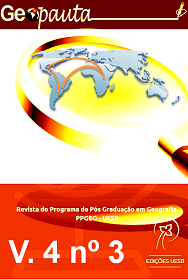The afros speak! Activism and political management promoting the Decade of Afrodecesdants
DOI:
https://doi.org/10.22481/rg.v4i3.7490Keywords:
Blacks women`s movement. Interseccionality. Afrodescendant.Abstract
The work proposes an approach to the action of militant organizations of afrodescendant women in Latin America in the frawork of the Decade of Afrodescendant, and their position on the outstanding debts of the states in relation to the situation of this population u¡in the countries of the region, especially women. It sets out the main demands of the political agenda of the black women´s movement in order to addressthe gaps of the inequality, poverty and the postponement of social rights, which disable this from human group for exercising full citizenship. It develops the efforts to afro militants in the generation of strategic alliances at the institutional level and with other civil organizations to promote social measures and government laws with a racial and gender perspective.
Downloads
Metrics
References
Agencia Española de Cooperación (AECID). (2016). Programa de Cooperación con afrodescendientes: Documentos de líneas estratégicas de actuación. Madrid, Aecid. Recuperado en: http://www.aecid.org.es
Andrea, N. [2000]. Lélia González y el pensamiento Amefricano: una entrevista con Flavia Ríos(Parte 1). Colectiva Oleaje. Ciudad de Mexico, Recuperado en: http://www.colectivaoleaje.com
Asamblea General de Organización de Naciones Unidas. (2002).Conferencia Mundial contra el Racismo, la Discriminación Racial, la Xenofobia y las Formas Conexas de Intolerancia. Declaración y Programa de Acción. Durban, ONU. Recuperado en: http://www.ohchr.org
Asociación Red de Mujeres Afrolatinoamericanas, Afrocaribeñas y de la Diáspora.(2015). Memoria Primera Cumbre de Lideresas Afrodescendientes en las América. Manágua, Recuperado en: http://www.oig.cepal.org.
Asuntos del Sur y la Organización de Estados Americanos (OEA). (2017). La agenda del activismo de las mujeres afrodescendientes en América Latina. Buenos Aires Recuperado en: http://www.oas.org
Comisión Económica para América Latina y el Caribe (CEPAL). (2017). Situación de las personas afrodescendientes en América Latina y desafíos de políticas públicas para la garantía de sus derechos, Santiago. Recuperado en: http://www.cepal.org
Comisión Económica para América Latina y el Caribe (CEPAL). (2018). Mujeres afrodescendientes en América Latina y el Caribe. Deudas de desigualdad, Santiago, Recuperado en: http://www.cepal.org
Dixon, B. (2015) Presentacion de las Politicas in: Cumbre de Lideresas Afrodescendientes de las Américas, la Red de Mujeres Afrolatinoamericanas, Manágua, Cepal.
González Batista, L. (2020). Cuando el color no basta: etnicidad nacional y afrofeminismos en Buenos Aires. Revista Humanidades & Educacao V.2, N.2, enero/junio 2020. Recuperado en: http://www.periodicoseletronicos.ufma.br/index.php/humanidades eeducacao.
Grupo Banco Mundial (BM). (2018). Afrodescendientes en Latinoamérica. Hacia un marco de inclusión. Recuperado en: http://www.knowledge.worldbank.org
OAS. Resolución AG/RES 2891 (XLVI-O16). (2015). Plan de Acción del Decenio de los y las Afrodescendientes en las Américas. Buenos Aires, Recuperado en: http://www.oas.org
OAS. Resolución AG/RES.2824 (XLIV-O/14). (2014). Reconocimiento del Decenio Internacional de los Afrodescendientes. Assuncion, Recuperado en: http://www.oas.org
Sánchez J.; Valencia, K. (2018). Las propuestas políticas del Decenio Internacional Afrodescendiente. Cartografías Del Sur. Revista de Ciencias, Artes Y Tecnología, nº 8, 169-199. https://doi.org/10.35428/cds.v0i8.121, Diciembre. Recuperado en: http://www.cartografiasdelsur.undav.edu.ar
Secretaria General Iberoamericana (SEGIB). (2016). Organizaciones de la población afrodescendiente en América Latina. Madrid, Recuperado en: http://www.segib.org
Downloads
Published
How to Cite
Issue
Section
License
Copyright (c) 2020 from the Geopauta Journal and the Author(s)

This work is licensed under a Creative Commons Attribution 4.0 International License.
Copyright
Authors must retain unrestricted copyright and grant the Geopauta the first publication with the work simultaneously licensed under CC BY which allows others to share with recognition of each author's authorship in the initial publication in this Journal
Intellectual Property and Terms of Use
Geopauta adopts the Free Access policy in accordance with Open Access - OAC recommended by DOAJ and in accordance with the SciELO Criteria, under a Creative Commons CC By Attribution 4.0 International License, allowing immediate free access to the work and allowing any user to read, download, copy, distribute, print, search or link to the full texts of the articles, track them for indexing, pass them as data to software or use them for any other legal purpose.
Geopauta attributes the CC BY. license. where it is allowed without restrictions:
Share — copy and redistribute the material in any medium or format for any purpose, even commercial. as long as they give due credit for the original creation.
Adapt — remix, transform, and create from the material for any purpose, even commercial purposes, as long as due credit is given for the original creation.












